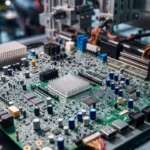Control algorithms are the backbone of automated systems, enabling precise, efficient control of processes, machinery, and devices across industries. This comprehensive exploration delves into the intricacies of control algorithms, unraveling their fundamental principles, key components, recent innovations, notable applications, and the transformative impact they have on reshaping the landscape of automation and industrial control systems.
Understanding Control Algorithms
Control algorithms are mathematical methods for regulating the behavior of dynamic systems by adjusting inputs or parameters in response to feedback signals. These algorithms aim to achieve desired system performance, stability, and responsiveness while minimizing errors and deviations from setpoints.
Key Components of Control Algorithms
The core components of control algorithms contribute to their functionality and effectiveness in automated systems:
- Feedback Mechanism: Provides information about the system’s output or performance, enabling the algorithm to adjust and correct to maintain desired behavior.
- Control Law: Defines the relationship between the system’s inputs and outputs, specifying how control signals are computed based on feedback and desired setpoints.
- Controller Implementation: This process executes the control algorithm, generating control signals that actuate actuators or modify system parameters to achieve desired control objectives.
Recent Innovations in Control Algorithms
Recent innovations have propelled control algorithms to new heights, enabling the development of smarter, more adaptive, and robust control systems. Notable advancements include adopting model predictive control, integrating machine learning, and using advanced optimization techniques.
Model Predictive Control (MPC)
Model predictive control uses dynamic system models to predict future behavior and optimize control actions over a finite time horizon. This enables proactive and adaptive control strategies that account for system dynamics and constraints.
Machine Learning-Based Control
Integrating machine learning algorithms into control systems enables adaptive and data-driven control strategies that learn from past experiences, sensor data, and feedback signals to optimize control actions and adapt to changing operating conditions.
Advanced Optimization Techniques
Advanced optimization techniques, such as genetic algorithms, particle swarm optimization, and simulated annealing, enable control algorithms to search for optimal solutions in complex, high-dimensional control spaces, thereby improving performance and efficiency.
Notable Applications of Control Algorithms
Control algorithms have diverse applications across industries and domains, improving productivity, quality, and safety in automated systems and processes.
Industrial Automation
Industrial automation regulates manufacturing processes, robotic systems, and machinery, optimizing production throughput, energy consumption, and product quality while ensuring safety and compliance with operational constraints.
Autonomous Vehicles
Autonomous vehicles govern vehicle dynamics, trajectory planning, and collision avoidance, enabling safe and reliable operation in diverse driving conditions and environments, from highways to urban streets.
Challenges in Control Algorithms
Despite significant advancements, automated systems face challenges that impact their widespread adoption and effectiveness in real-world applications. Addressing these challenges is crucial for ensuring stability, reliability, and performance.
Uncertain and Nonlinear Systems
Dealing with uncertain and nonlinear system dynamics poses challenges for control algorithms, requiring robust control strategies, adaptive control techniques, and model-based approaches to effectively handle variability and disturbances.
Real-Time Implementation
Implementing control algorithms in real-time environments with strict timing constraints and limited computational resources requires efficient algorithms, optimized code, and hardware-accelerated processing to ensure timely and responsive control actions.
Future Trends in Control Algorithms
The trajectory of control algorithms indicates exciting trends that will further redefine their capabilities and applications in automation and control systems. These trends promise to enhance intelligence, adaptability, and autonomy, ushering in a new era of smart and autonomous systems.
Reinforcement Learning-Based Control
Adopting reinforcement learning techniques enables it to learn optimal control policies through trial-and-error, exploration, and reward feedback. It leads to adaptive, self-improving control strategies in dynamic, uncertain environments.
Swarm Intelligence and Multi-Agent Systems
Swarm intelligence and multi-agent systems enable the distributed coordination of multiple agents or entities, providing scalable, robust, and adaptive control solutions in complex and dynamic environments.
Conclusion
Control algorithms drive precision, efficiency, and automation across various industries and domains. From industrial automation to autonomous vehicles, the impact of control algorithms extends across diverse applications, reshaping how we design, operate, and optimize automated systems and processes. Despite challenges, ongoing innovations in model predictive control, machine learning, and optimization techniques promise a future where control algorithms continue to push the boundaries of what is possible in automation and control systems, unlocking new opportunities for intelligence, adaptability, and autonomy in a rapidly evolving digital landscape.





